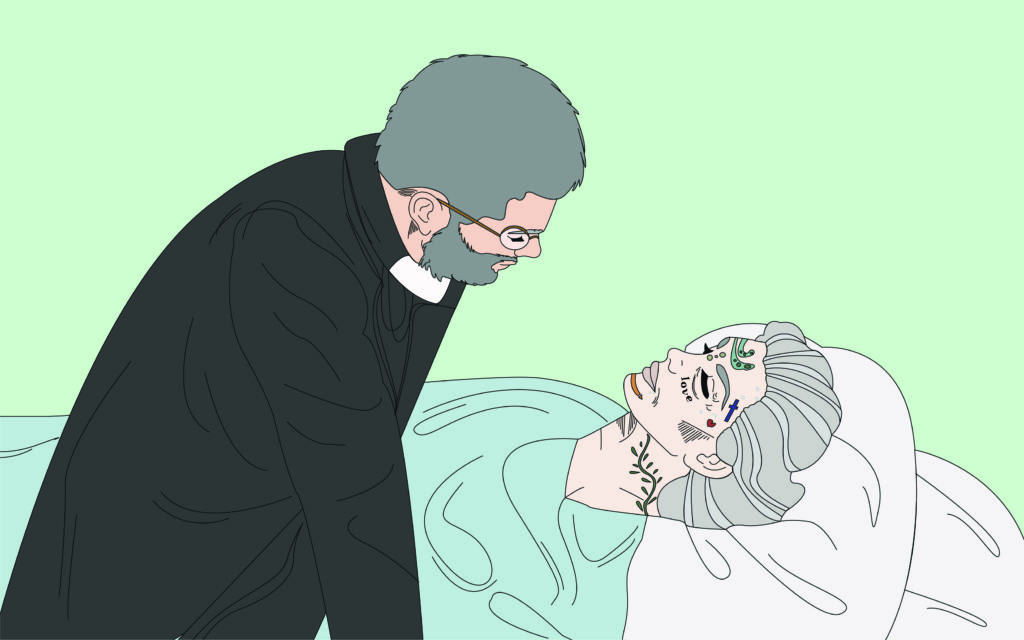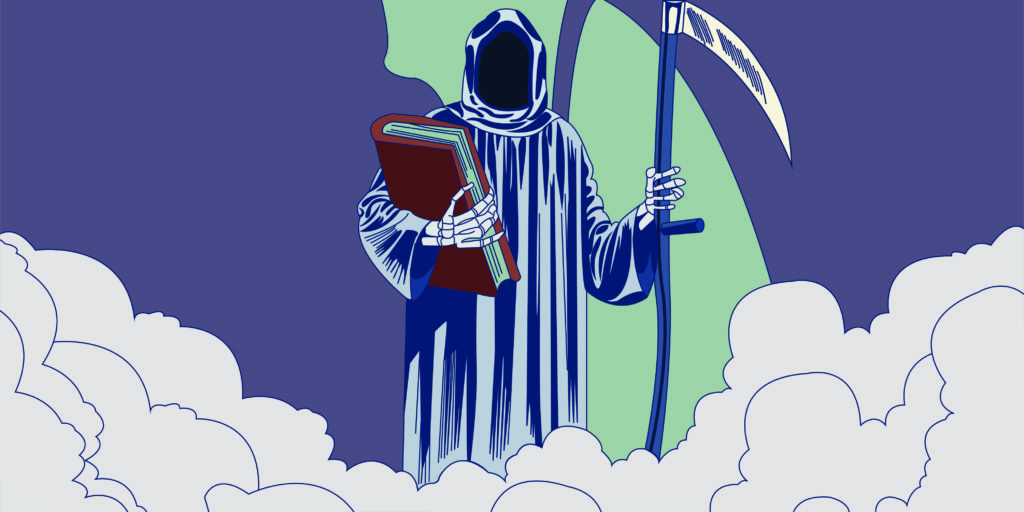Death has been a wise mentor for my ongoing journey of faith. Now a retired pastor, death has also broken me, along with challenging me to heal.
Did we discuss dying, and death, and how they would impact ministry in the bygone days of seminary education? Not so much. There were the predictable discussions about Jesus’s death. But those were theological, like the exploration of differences in the Gospels about who was at the cross or tomb and why. We also studied, briefly, the myriad views about death when comparing the world’s religions. Death in the classroom was abstract. Odd (or maybe not) that I recollect one other glimpse of death from seminary. A fellow student lived downstairs in the housing for married students. We played chess. We probably argued about Rudolph Bultmann for an upcoming exam. We might’ve shared a beer. He drifted through several semesters and then died by his own hand.
No one, in a setting where everyone talked, talked about his suicide. Why?
“Silence is a source of great strength,” Lao Tzu supposedly claimed.
But not always.
I was part of numerous deaths in a career which included campus ministry, hospice, and churches. I’ll mention three, since there’s no need to review all of my thousand funerals. Well, I exaggerate! Except that anyone in ministry for over 40 years has witnessed — in literal and figurative graveyards, in hospitals, in living rooms with rearranged furniture, beside weary and anxious caregivers — a considerable amount of dying, death, and grief.
•
My earliest ordained action wasn’t celebrating the sacraments of baptism or communion. It wasn’t officiating a wedding, preaching a sermon, praying before a potluck, welcoming a membership class, or any of the other formal and informal events of ministry.
Death came a calling, elbowing to the front of the line.
A few weeks after my ordination, I was hired for a year-long intern position. At that lively suburban congregation, my primary responsibilities involved youth work and Christian education. With three full-time clergy on the bustling staff, all likely glad my presence meant they could worry less about keeping the youth busy with stuff Jesus and the parents would give a thumbs-up to, I didn’t get many pastoral leftovers. I listened to a weekly dose of sermons, while politely sitting near the pulpit. I noted how one pastor did communion differently than another. I smiled when a clergy colleague hoisted a baby into the air during baptism. I was the new guy on the bench, fourth in line for most ministerial duties.
Then, one day, the church office phone rang. It became my call.
Someone had died. The deceased was not part of the congregation. The man on the phone, who explained his father had just died, was also not a member. However, the caller desperately pleaded for a pastor to do the funeral. The church’s three other ministers, busy as ordained beavers, weren’t available.
Why not let Rev. Newbie do it?
Not long after the call, I entered a home where a family was stunned by death. A mid-40s son, the one who had contacted the church hoping for a minister (any minister), was now an emotional wreck. Months into my official ministry, with a bundle of book knowledge about God and Jesus, I attempted to comfort a room of sobbing or silent, distraught, or distracted grievers.
Ralph Waldo Emerson was correct: “Sorrow makes us all children again, destroys all differences of intellect. The wisest know nothing.”
Death, ever the teacher, whispered, Be tender with them. I tried, grasping the vulnerable truth of Emerson’s words: the wisest know nothing in the time of sorrow. With that first grieving family, with tenderness, with mistakes, with input from my colleagues, I tried my ordained best. I also learned dying and death never topped anyone’s to-do list, until they are suddenly the only thing on the schedule.
•
I had just been appointed to my third church.
Which was also one of three churches I then started to serve.
In order to support my wife’s dream of working on a doctorate, we moved to Wisconsin. Ah, the land of the Cheese-heads! One of the church openings about an hour’s drive from the university was a three-point charge. Ah, a trifecta of churches! They were located in the southwest region of the state, a rolling landscape boasting more dairy cows than people, with each church separated by a pedal-to-the-metal fifteen-minute drive.
First worship at nine o’clock. Then, before the service ended, I sped to the next Sunday adventure, arriving after the opening prayer. With no time for greeting anyone at the second congregation, I made the hasty drive to the final worship service. In the third church, I could actually linger with the congregation. However, after three worship services, I was worn out and worn down. On most Sundays, it was also a time of wondering how bad the first, second, or third sermon had been.
Before my initial Sunday worship at the middle church, I was informed an older gentleman would tend to the building’s needs. He unlocked the church every Sunday. He cranked on the heater in winter and the air conditioner in summer. He was the guy — this is how I would recognize him — who brought a glass of water to the pastor. Sermonizing is thirsty work! Sip some water before giving the pew-dwellers a dose of Gospel thunder and lightning.
There was no older gentleman serving water on my first Sunday. What I didn’t know, and what others didn’t know, was that he had been taken to the hospital. I learned about his situation when called by a member of the middle church after completing worship at the third church. Mr. Smith (not his real name) was in the emergency room. Last week, he was fine. Not now.
Three worship services and then I was off to the hospital located at the county seat, the fourth town I would visit on that Sunday.
Mr. Smith died before my next worship service with the congregation he loved.
I had seen him in the hospital. What a sweet, cranky, loving, funny guy. His wife, and this I don’t make up, was named Grace. Such a perfect name for her. Mr. Smith had offered water for decades of preachers. He was an essential pillar in a little village church in farm country. He and his wife were beloved in a community where everybody truly did know your name. I happened to be the pastor when Mr. Smith took his final breaths.
I wept for a man I hardly knew. And I did his funeral with humility and a deep belief that God had received him into the Realm of Heaven.
Death forced me to quickly plunge into the remarkable life of a small church in a small town in an obscure location on a Wisconsin map. Often, a pastor has no idea if he or she has made a difference. With that church, that family, and that community, a sad death helped me become a trusted part of their lives.
Death, ever the teacher, said to me, Love them. With a grieving family, with love and with Grace, I tried my best.
•
While serving what became my final church, a woman phoned the office. She had heard the church was progressive and open-minded. (Or wishy-washy depending on your religious views?) Her mother was dying, and the daughter sought a pastor who could offer comfort and support. She did not want a minister who might be judgmental or dismissive of her mother’s tattoos.
Why not call me?
Over the next weeks, I visited her Mom several times. I would eventually officiate at her simple memorial service.
The church I then served as senior pastor was, and is, a wonderful congregation. And yet I wasn’t sure it was the best fit for my limited gifts as a minister. Or, to use Frederick Buechner’s one sentence sermon, was it truly: “The place God calls you to is the place where your deep gladness and the world’s deep hunger meet?” The constant personnel issues frequently felt like Jesus’s millstone around the neck in Luke 17. The obligations — multiple worship services, meetings at night, nonstop community demands — were relentless. With a workweek that seemed eight days long, Jesus was getting a good deal. But was I? Was my wife? And then that out-of-the-blue call came.
I visited the Tattoo Lady. (That’s how I remember her.)
I sat by her bed. She indeed had tattoos on most of the skin I observed. I never mentioned them. Neither did she. But we discussed love, God, heaven, hope, her tenderhearted and irksome daughter, her fractured dreams, and men who abused her. We prayed together. I served her communion. I baptized her in Jesus’s name.

And then I helped her daughter bury her.
Next to her, maybe with the Holy whispering in my ear, or maybe it was merely a breeze, I began to realize I was a small church fella. Perhaps her dying also nudged me to rekindle hospice thoughts. Once, briefly, I had been a hospice chaplain. While ministry in a thriving suburban congregation has many rewards, my personal spiritual balance sheet was in the red. Sundays, and my life, were a blur; I was constantly confronted by my administrative weaknesses and rarely had opportunities to explore my faith-based strengths.
Death shuffled between us in the Tattoo Lady’s bedroom. While I then thought myself a lousy — and exhausted — pastor, I believed I made a difference for her. Those visits were whole and Holy moments, where compassion reigned, and love was a mutual, equal offering.
Death, ever the teacher, wondered, Is it time for a change?
Less than a year after my final prayer with the Tattoo Lady, I bid farewell to that wonderful congregation. Several years later, I returned to working in a hospice, with an emphasis on grief support for family and friends struggling with a loved one’s death.
Death was my initial professional step as an ordained minister. In every congregation, when death arrived, I made mistakes, and could’ve done better or differently with my responses. But most of those experiences allowed me to authentically strengthen my relationship with a church or family or individual.
Calling death a teacher during my career doesn’t mean the lessons were all blessings. There were children who died. Church members had fatal car crashes while going to the grocery store. My support felt meaningless when a suicide forever wounded a family. In my personal world, one of my grandparents was murdered. My father’s ever-worsening dementia prolonged his dying, prompting my mother to occasionally mutter, “These golden years aren’t so golden.” Mom’s death, in the year following Dad’s, was as breathtakingly rapid as his was protracted. Her sudden cancer diagnosis was a brutal storm without warning.
Poet Mary Oliver wrote about living, which also means writing about dying, with:
It is a serious thing
Just to be alive
On this fresh morning
In this broken world.
I believe death is a serious teacher for this broken world, providing the living with honest experiences that help us greet the next fresh morning. Though too many — believers and non-believers alike — avoid even mentioning dying, death, and grief, I am grateful for the lessons. •




